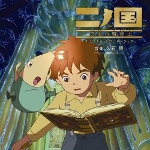Ni no Kuni -Sorcerer of Darkness- Original Soundtrack
 |
Album Title: Ni no Kuni -Sorcerer of Darkness- Original Soundtrack |
| Record Label: Frame |
|
| Catalog No.: PKCF-1036 |
|
| Release Date: February 9, 2011 |
|
| Purchase: Buy at CDJapan |
Overview
The Ni no Kuni -The Sorcerer of Darkness- Original Soundtrack marks a huge first in the gaming industry, being Studio Ghibli’s first proper video game, developed in collaboration with Level 5. Joe Hisaishi, resident composer for all of Studio Ghibli’s works, of course leant his services to this title,. Notorious as being one of the biggest DS carts produced, the game was able to accommodate the usage of high quality audio and features recordings from the Tokyo Philharmonic Orchestra. Expectations were understandably high. How does the end result compare?
Body
The album opens with the aptly titled main theme. The theme opens with a bombastic opening which soon gives way to a delicate piece with a wonderful melody. The piece continues to evolve through boisterous and gentle sections, ever shifting to capture the listener’s attention in its entirety. Truly, this is an excellent way to start off the album, and reflects that Hisaishi’s magic extends to video games too. “Field” is an incredible arrangement of the main theme, and from its rapturous opening to its beautiful and wonderfully orchestrated melody, the piece doesn’t let up. It is truly one of the most exciting and enjoyable works that Hisaishi has created.
Among other scene-setters, “Morning of Beginning” is gentle and peaceful in its entirety. The flute plays a simple lighthearted motif as the strings, supported by the glockenspiel, play a simple, graceful melody. “Labyrinth,” however, is well suited to the task of unnerving, with its chromatic staccato chords on the strings and octatonic brass sections, while the melody itself, when present, enchants. Among the cinematic cues, “Hotroit” starts rather light but effusive, holding back yet releasing its energy bit by bit until its bombastic finale. “Incident Occurrence!” follows a similar progression, though its melody is a bit more tense and stressful.
Another central cinematic theme on the soundtrack is “Aria ~Recollection~”. The glockenspiel in the original version aids the strings in painting a very mournful, melancholic picture. Its simplicity makes it relatable, though there is a great deal of complexity under the surface. “Tension” is, as the name implies, a tenser version of the aforementioned — faster in tempo and featuring some frantic woodwind and percussion work to help unsettle the listener. Meanwhile “Miracle ~Reunion~” is a dramatic variation of the aforementioned. The piece is brilliantly delicate and intense, varying its mood effortlessly and the great effect. Its reappearance surely enhances the scene it is used in.
There are a few other playful themes on the soundtrack used for a range of scenes. “Neko Kingdom’s Castle Town” is a lighthearted town theme that evolves into quite a boisterous piece, excellently portraying through its busy orchestration a town abuzz with populace. “Desert Kingdom’s Town” is a bit more atmospheric and moody than the preceding, though it too develops a very distinctive sort of feel for a very different sort of town, using percussion and sitar to create a theme that fits the track’s title. Full of Hisaishi’s musical fingerprints, “Shizuku” is likewise a brilliant little lighthearted piece that keeps its quiet charm despite its aggressive instrumentation.
The action themes, which are just as central to any RPG, are less enjoyable, though not by much. “Battle” is a rather laidback theme given its purpose. While it is quite busy, it isn’t terribly bass heavy. The melody, however, carries the piece through and ensures it is extraordinary track in its own right. “Imargen Battle” doesn’t have this flaw, and, while playful, it sounds like a proper battle theme, though it isn’t as melodically interesting. “Final Battle” is, quite fittingly, the most impressive of the bunch. Hisashi creates a rather powerful, fluctuating texture that fits the scene well, though the piece lacks a definable melody for stand-alone listening.
The album closes with “Fragments of Hearts,” a vocal version of the game’s main theme. Mai, the vocalist’s, enchanting voice is a perfect match for this exquisite theme, and carries it from its initial gentle opening, as it picks up and finally ends as quietly as it began. It’s a most effective conclusion to the soundtrack.
Summary
This album is wonderful, and every track is an absolute joy to listen to. Yet, perhaps due to its short length, or its reliance on event themes, the album feels unbalanced, focusing too much on choice themes. Each track is individually perfect, yes, but as a whole the soundtrack cannot stand amongst the greats. Perhaps a greater variation is what this album is missing and Rei Kondoh’s in-game music could have been an excellent supplement. Regardless, there is nothing to outright dislike here, and any fan of game music or Joe Hisashi’s past work would be wise to add this soundtrack to their collection.
Do you agree with the review and score? Let us know in the comments below!
4.5
Posted on August 1, 2012 by Marc Friedman. Last modified on January 19, 2016.














